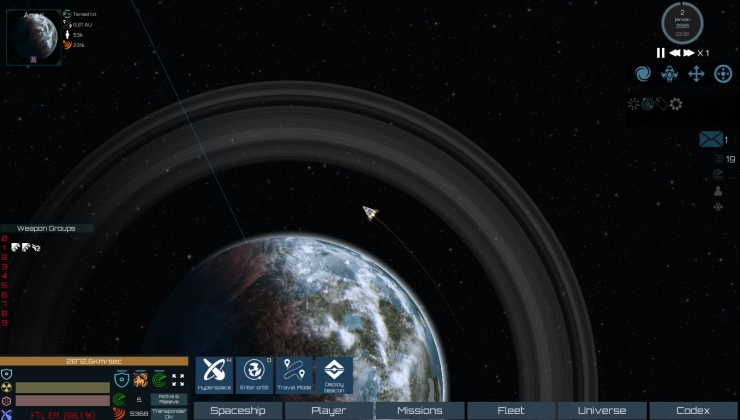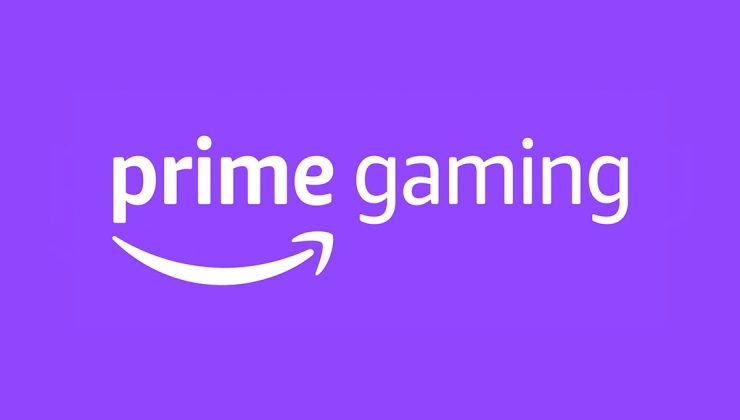For anyone who has been around Linux gaming for a while, the names Ryan "Icculus" Gordon and Ethan Lee will be well known as developers who port games to Linux and work on the tech behind tons of games.
Recently, our friends at Nuclear Monster spoke to both about Proton and the upcoming Steam Deck. Both giving a very different outlook on the future of Linux gaming, so it's interesting to see their perspectives on this considering how respected they both are for their work. For those who don't know Ryan Gordon maintains a lot of SDL, the MojoSetup installer (used by GOG), MojoShader, and ports to various platforms (not just Linux). Ethan Lee created FNA, the reimplementation of Microsoft's XNA, and Lee has probably ported more to Linux than anyone else (along with macOS too).
In the post with Ryan Gordon, it starts off with a little personal thought from the writer (who is sceptical of relying on Wine/Proton) but Gordon sees it differently. Gordon mentions it's no longer a case of talking about how many people directly use Linux of the desktop or how many install SteamOS but the focus will be on sales number for what's basically a type of games console. It is an interesting point, as eventually it could lead to millions of people with a Linux-powered handheld:
And maybe someday down the road, if this is wildly successful, we tell people that it’s a no-brainer to target 18 bazillion Linux users that aren’t Linux users so much as customers reliably running a Linux-based game console. The end result for you and me—clicking “install” in our desktop Steam client—is the same, even if it took millions of unaware and uninterested other people to get us there.
Ryan Gordon - Nuclear Monster Interview
The subject of porting to Linux did come up too. Since Valve have and continue to invest into Steam Play Proton, they're telling developers you don't need to port. Here's what Gordon had to say on that:
Even in the short term, one can always make the argument: okay, sure, your Windows game runs here, but you want more performance, more control, and no worries that Proton didn’t quite paper over some Windows thing weirdly? Then stop letting Valve treat your game like some RetroPie target and do a real Linux port. That choice is available to you now, almost six months before anyone will hold a Steam Deck.
Ryan Gordon - Nuclear Monster Interview
Gordon further mentions how we should hustle, not think of it as some kind of funeral for Linux gaming.
The complete opposite it true when Nuclear Monster spoke to Ethan Lee, who was far more negative about the whole situation. Lee sees Proton as an "essential preservation project" and did even contribute work to it when contracting for CodeWeavers. However, Lee seems to think that Proton and Valve's marketing with the Steam Deck will result in packing up shop and moving on from game porting:
I have my remaining contractual obligations, but short of a complete 180 from Valve that is very very loud I have to walk away and go do other things for a living. A course correction is unlikely, as they seem abnormally confident that developers will just magically come to me after the device’s inevitable success, which is basically asking me to just casually accept that I’m going to endure even bigger losses than I already have with an empty promise that my business will turn around based on a third party’s big risk that they think anyone can endure. It feels very like much I built my own casket having worked on Proton, and as they’re shoveling dirt onto me they’re going “don’t worry, you’ll be fine when someone else finds you!”
Ethan Lee - Nuclear Monster Interview
Sounds like Lee will also be moving away from FNA development too. Both interviews are worth a read.
What are your thoughts? You can see some of our early thoughts in a previous article.
I think valve plays the long game here, we have a saying: befriend the devil until you cross the bridge.
While I don't dismiss what Ethan says, I'm more inclined to side with Gordon.I hope the same, but until then, what should Ethan do if devs aren't hiring him for a while? Let's hope there will be enough devs and/or publishers to contract him until the bridge is crossed.
I think valve plays the long game here, we have a saying: befriend the devil until you cross the bridge.
Ethan has recently asked about game developers being approached by Valve for making their products run Proton instead of having a native Linux version, and that's honestly despicable from Valve, if you ask me. (Source: https://twitter.com/flibitijibibo/status/1416118465442852869 )
SteamOS has not been updated in... forever. The repositories are a sad sight to see. And now they have SteamOS 3.0 for the Steam Deck, based on Arch, but how does that relate to the desktop version of SteamOS and will there be an updated repository (for the Steam Deck)? Nobody knows.
I'm not an Arch user myself, so I don't know how that stuff works. If you want to drop a new user onto any flavour of Linux, I tend to prefer Debian and its related family of distros such as Mint and *buntu since their binary setup with a .deb-based package manager makes it fairly consistent to help people across the distro family, even if *buntu makes it a bit weird with PPAs and whatnot.
I once made the mistake of trying out Gentoo when just learning about Linux and that was a jump into the deep that I can't recommend unless you pick things up fast or have masochistic tendencies. (j/k :D)
I'm not sure the Steam Deck will do for Linux what we hope it does. There needs to be synchronous updates for SteamOS that actually go beyond Steam Deck so people can have their handheld experience be similar to what they can install on their desktop, laptop, or other computing device at home to help the adoption of Linux as a whole in a household. Just having a dock that allows using the Steam Deck as a mini-computer is not going to be the end-all fix.
As a user, I'm still thinking developer support and visibility of Linux as a gaming OS are the most important things in the long run. I don't mind all the translation layers in-between, as long as it works the same (or with a small performance penalty) as on other platforms.
Last edited by jens on 21 Jul 2021 at 10:06 am UTC
So it seems that this time Valve does not want this dependency. They control Proton, they work with Wine developers, so if something breaks, they can fix it themselves. Thus this time the message to developers is not to develop for Linux, but to ensure that their games use Proton-friendly technology (especially Vulkan) and Valve would take care of the rest.
Last edited by skinnyraf on 21 Jul 2021 at 10:14 am UTC
On one hand, it's a good thing: many, many, many titles would not be played/playable in Linux without that framework (I'd dare say that "line of thinking"). I constantly play EVE Online, GTAV, Elite: Dangerous, Borderlands 3, and as we all know, it'd be nigh impossible to enjoy these games without a very refined compatibility layer.
On the other hand, of course having this "lazy way out" means fewer developers would care for a native port, or contract some third party (Feral, Aspyr, then-Icculus, etc.) to port their stuff over some form of linuxware. And that's not so good.
On the other (!) hand, companies investing into any form of Linux engagement can't be seen as a bad thing, from the POV of a Linux gamer like I am. Valve isn't into it for the glory, of course, or for eternal gratitude of us penguin fans - even if the fatman has my own eternal gratitude! But I'd rather see development in this field than leaving the entire ecosystem dead and gone.
I mean, Linux already completely dominates the markets for:
- embedded
- devices in general/IoT
- smartphone
- microservices
- containers/virtualization/cloud (even Azure!)
- backend server
- research/academia
- AI
- supercomputing (top500 is the best Linux ad ever)
I think it was always just matter of time before the penetration of the kernel would reach console/games/mobile world.
Considering the Android market - especially in Asia, one can speculate that there already more games played on a Linux kernel on any single day than on any other platform (PC/Win + console) combined.
But then again, the incredible progress of WINE/Proton in the very few last years is a mixed blessing, and I can't make up my mind if it's a godsend or a hidden curse.
Native Versions are always better and how thing are going i think we will see less and less native ports since why bother when we have Proton right?
Native versions (i.e. software developed as multiplatform from the start and readied for Linux and Windows at the same time) yes. Ports - not necessarily. Late releases, poor performance, lack of cross-platform, dropped support forcing people to switch to Windows builds anyway - they all exist.
I guess the point for valve is to bring users onto the device, by having enough games working good enough, and then if the device ends up being used enough, the developers would follow and make the effort to either keep their games working for proton, or have more control on it and do a native port.
Anyway, they are doing much better on the marketing part, and on the more simple options to chose from, as well as the prices. The steamos, steam controller idea to allow to play mouse/keyboard games, and proton to increase the available library without requiring to move the whole gaming ecosystem all come together nicely and actually makes a lot of sense.
Bringing the openness of the PC to a console-like market.
Do I need to port my game to Linux to have it work on Steam Deck?
No porting necessary. Your Windows build will likely work right out of the box, thanks to Proton.
Will people be able to install Windows, or other 3rd party content?
Yes. Steam Deck is a PC, and players will be able to install whatever they like, including other OSes.
Not even a hint about the benefits of multiplatform development, and nothing to suggest that staying with SteamOS would give a better experience than installing Windows on it.
However, game devs and Windows gamers are easily spooked, and to make any difference at all Valve need to get these devices into people's hands.
I'll still be applying the sliding scale. Getting more games into the 50% category is great for everyone, but it sure would be good to get more into the 100% category. There are dozens of new games released on Steam every single day, as well as every game's patches, and Valve has a couple of hundred employees. Testing and fixing has to be the responsibility of the game devs themselves.
So it seems that this time Valve does not want this dependency. They control Proton, they work with Wine developers, so if something breaks, they can fix it themselves. Thus this time the message to developers is not to develop for Linux, but to ensure that their games use Proton-friendly technology (especially Vulkan) and Valve would take care of the rest.
Hm. Seen from developer's side, the opposite would be true: You control your port, but not what happens with Proton.
In the end, it will all come down to dedication and demand. SteamDeck is a real platform with real limitations, so developers might very soon start making it a direct target to make their game appealing like they do on consoles. They won't do it until they checked their options and estimated demand, though.
Ethan Lee is a very special porter that can't be praised enough. I hope he'll find some projects to survive until hopefully demand will raise again. I can actually imagine him getting into consulting for a while, he could teach best practices to those who seriously want to get into native SteamDeck development.
Most bigger porting studios though used to use compatibility layers anyway, I really don't consider Aspyr a loss compared to what we gained with Proton. Feral pretty much gave up on Linux for ?years? now, there's hardly anyting to accelerate any more.
Last edited by const on 21 Jul 2021 at 1:04 pm UTC
In one hand Valve send money to game vendors for each sold copy. Not manner, if it is Windows version or Linux, company get paid the same amount of money. I do not known, why, in this case, companies should do Linux port. They will have Proton.
But in other end. If Linux customers will ask for Linux port, they will got it. Of course, in cases, when they will be much Linux users.
Most important thing is to made developing for Linux easier than Windows. Valve should take focus on Steam Runtime (there is many Steam Runtime, such like soldier). Case Linux is Open, creating tools for developers should been simpler. I am developer, but not professional. I use only IDE, compiler, valgrind, build tools, gdb and KVM with Qemu + Libvirt.
Most important thing is to made developing for Linux easier than Windows. Valve should take focus on Steam Runtime (there is many Steam Runtime, such like soldier). Case Linux is Open, creating tools for developers should been simpler. I am developer, but not professional. I use only IDE, compiler, valgrind, build tools, gdb and KVM with Qemu + Libvirt.
I think this demonstrates a lot of ignorance of the Windows development environment. Speaking as someone who does POSIX-platform development professionally, the development experience on Windows is pretty nice (assuming you don't treat it like Linux). I'd much rather use Visual Studio than gdb. For gamedevs in particular, stuff like [PIX](https://devblogs.microsoft.com/pix/introduction/) was essential to debugging graphical programs. Of course, Valve realizes that tooling is essential - that's why they've invested in Renderdoc.
I'm not an Arch user myself, so I don't know how that stuff works. If you want to drop a new user onto any flavour of Linux, I tend to prefer Debian and its related family of distros such as Mint and *buntu since their binary setup with a .deb-based package manager makes it fairly consistent to help people across the distro family, even if *buntu makes it a bit weird with PPAs and whatnot.
Being a ChimeraOS user, I can tell you that it's Arch, but it's not Arch at the same time. The basic user that just want to pickup de Steam Deck and play Steam games will probably never have to meddle with the system so he/she won't even notice that it's Arch that runs. All updates will be pushed through tools like frzr that will send a complete and "Valve approved" image of the system partitions.
The only part where I'm curious to know how it will be done, it's on the "Steam Deck desktop" side and all that productivity stuff... Will Valve create a SteamOS app store that integrates Proton too? Looking forward to discover how it works. They must have tought about something for those that are not tech savy.
Last edited by Mohandevir on 21 Jul 2021 at 1:47 pm UTC
Valve control the gaming, Valve control "Proton" (yes, it's open source, but Valve still realistically control how it's used), and Valve are essentially saying to make games for Windows.
Remember that Valve does not care for GNU/Linux. At all. It cares about not being under Microsoft's thumb, and GNU/Linux has been a means to that end. Can't even call it GNU/Linux soon, as Steam is proprietary and very locked down.
From a business and corporate perspective, Valve are doing their job well. I don't blame Valve for anything at all, just to be clear.
I don't see it good for GNU/Linux however. It's consolidating more gaming under the control of someone who is not the user. If a user doesn't mind that, well, fine. Their choice, nothing wrong with that. I'm personally not a fan of this direction, don't, haven't been for some time, don't view it as progress, and nothing wrong with that as my opinion either.
So why even write this? In the hope people think about what's happening with their gaming, with their systems, and ask themselves if they're truly ok with it (regardless of what the answer to that may be).
You got really valid points that crosses my mind from time to time, but objectively... Remove Steam from the equation and return to pre 2012 gaming... Is gaming on Linux a thing? We are kind of stuck, imo. I chose the "lesser evil" even if some "would rather not chose at all".
Edit: This said, you can still choose not to use any Valve solutions and just run every games through Lutris or Wine and still benefit from Valve's investments (Codweaver/Drivers).So it did much for GNU/Linux anyway.
Last edited by Mohandevir on 21 Jul 2021 at 7:11 pm UTC
So, this is a great problem. I can search and fix the problem, but a lot of people, if they can not play a multiplayer game with it's friends, will just blame linux.
I can understand Steam trying to make that all games in linux, can run easy and unattended with proton. This way, the less tech savvy user can use and buy all the games without doubts
For the games that require third party stores... wonder how they'd work with a native version of their stores, would they integrate Proton into their stores so that older games that they won't patch will work, while newer games could be native? That'd be interesting to see. Either way, very interesting times ahead!
The biggest problem I see is all the 'well almost works flawlessly in Proton, but you have to add command parameters to get it to work' games. People just buying this to have a portable Call of Duty are going to be disappointed when they have to hack around with command parameters to get it to work... and then just try to figure out how to install Windows...
I don't see it good for GNU/Linux however. It's consolidating more gaming under the control of someone who is not the user.
But what else than Valve/Steam? Valve controlling large spectrum on gaming comercial-linux-market. I think open source are not so great than closed source/commercial. I do not tell open source software is bad. It is great. I use only open source software (excluding firmware, DRM for video watching, BIO, etc.), but no games. I am happy with that. If open source games give any alternative, I will use open source games.
I can paid for open source software. I was give donation to KDE team recently. Of course, I give a lot more for closed source software/games, but as regular user, I think open source software should give this benefit (cheaper), because it is a democracy/free market and in this case money are better used (I paid for what I want - for example - I do not like option A, I do not paid for it and it never will be added to some open source software, etc. ). Maybe that means, open source software developers get smaller amount of money, but I am not 100% sure. Firstly, there is no piracy and people will paid as much as they can. Secondly OS developers can collaborate with other projects and charity people (sorry, English is not my native) easier, so there is not the same cost of creating software.
In summarize, I can paid for Open Source software, but if Open Source games are worth it? Of course - freedom is very important and If we paid corporation, it will lobby to take of more of our laws, etc. But gaming is like watching movies - it is like communing with culture. If I do not commune with culture, I will be really freedom?











 How to set, change and reset your SteamOS / Steam Deck desktop sudo password
How to set, change and reset your SteamOS / Steam Deck desktop sudo password How to set up Decky Loader on Steam Deck / SteamOS for easy plugins
How to set up Decky Loader on Steam Deck / SteamOS for easy plugins
See more from me